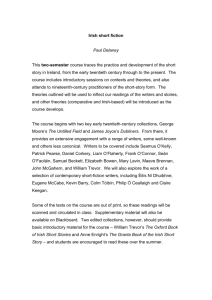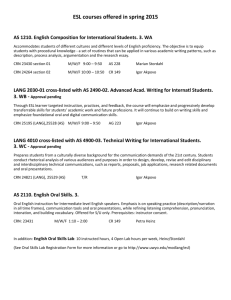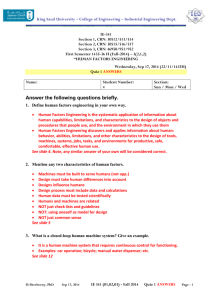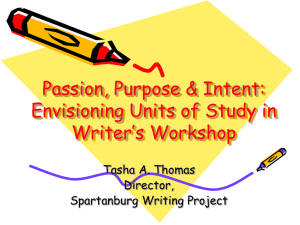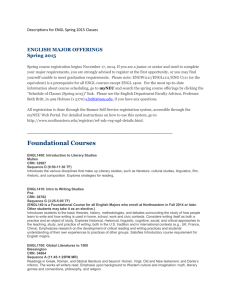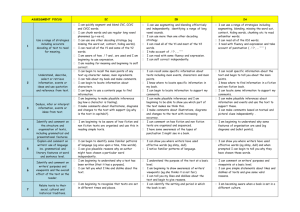Spring 2016 Courses
advertisement
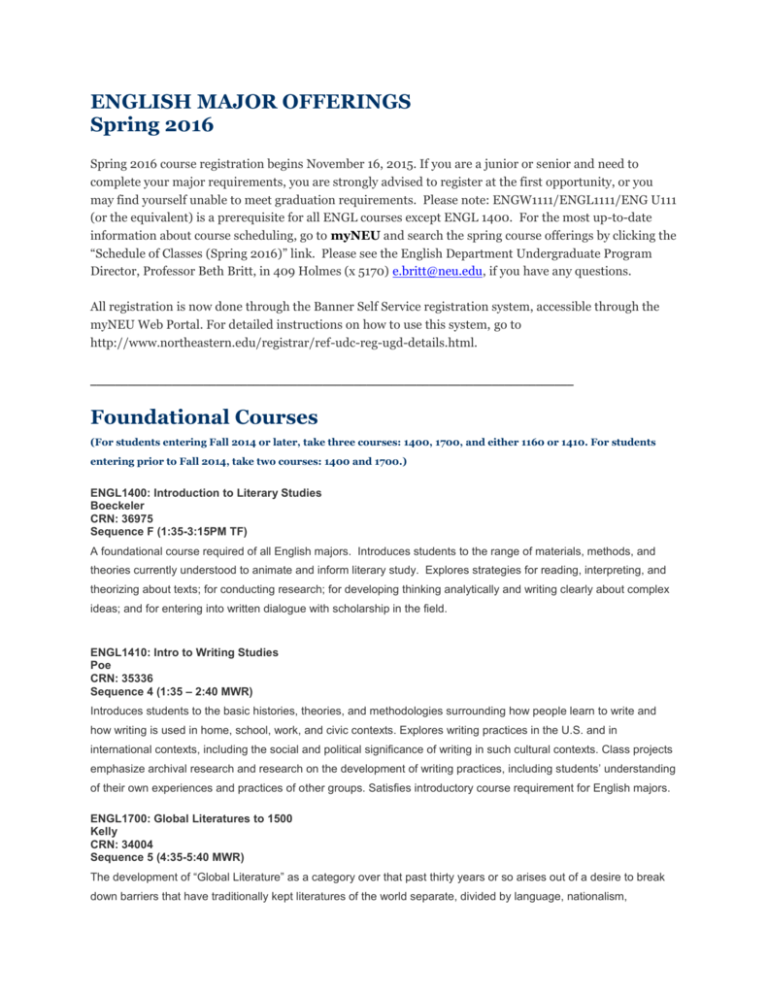
ENGLISH MAJOR OFFERINGS Spring 2016 Spring 2016 course registration begins November 16, 2015. If you are a junior or senior and need to complete your major requirements, you are strongly advised to register at the first opportunity, or you may find yourself unable to meet graduation requirements. Please note: ENGW1111/ENGL1111/ENG U111 (or the equivalent) is a prerequisite for all ENGL courses except ENGL 1400. For the most up-to-date information about course scheduling, go to myNEU and search the spring course offerings by clicking the “Schedule of Classes (Spring 2016)” link. Please see the English Department Undergraduate Program Director, Professor Beth Britt, in 409 Holmes (x 5170) e.britt@neu.edu, if you have any questions. All registration is now done through the Banner Self Service registration system, accessible through the myNEU Web Portal. For detailed instructions on how to use this system, go to http://www.northeastern.edu/registrar/ref-udc-reg-ugd-details.html. _____________________________________________________________________________ Foundational Courses (For students entering Fall 2014 or later, take three courses: 1400, 1700, and either 1160 or 1410. For students entering prior to Fall 2014, take two courses: 1400 and 1700.) ENGL1400: Introduction to Literary Studies Boeckeler CRN: 36975 Sequence F (1:35-3:15PM TF) A foundational course required of all English majors. Introduces students to the range of materials, methods, and theories currently understood to animate and inform literary study. Explores strategies for reading, interpreting, and theorizing about texts; for conducting research; for developing thinking analytically and writing clearly about complex ideas; and for entering into written dialogue with scholarship in the field. ENGL1410: Intro to Writing Studies Poe CRN: 35336 Sequence 4 (1:35 – 2:40 MWR) Introduces students to the basic histories, theories, and methodologies surrounding how people learn to write and how writing is used in home, school, work, and civic contexts. Explores writing practices in the U.S. and in international contexts, including the social and political significance of writing in such cultural contexts. Class projects emphasize archival research and research on the development of writing practices, including students’ understanding of their own experiences and practices of other groups. Satisfies introductory course requirement for English majors. ENGL1700: Global Literatures to 1500 Kelly CRN: 34004 Sequence 5 (4:35-5:40 MWR) The development of “Global Literature” as a category over that past thirty years or so arises out of a desire to break down barriers that have traditionally kept literatures of the world separate, divided by language, nationalism, geography, and politics. In this course, we’ll read several long narratives—tales of adventures to places like Troy, the faerie Otherworld, and the far reaches of Mongolia—from 2100 BCE through 1500 CE. Can we trace out a line of influence form one text to another? How do genre conventions travel over time and from place to place (imitated, borrowed, or stolen—in the most positive sense)? We’ll read The Epic of Gilgamesh (Mesopotamia), Homer’s The Iliad and The Odyssey (Greece), excerpts from Dante’s The Divine Comedy (Italy), Mandeville’s Travels (England); the Táin Bó Cúailnge (Ireland); the Song of Roland (France); Sundiata (Africa); and excerpts from The Mabinogion (Wales), The Secret History of the Mongols (Mongolia), the Tale of Genji (Japan), and the Arabian Nights (India, Persia [modern Iran], Syria and Egypt). We will supplement our texts with a few films (the 2004 Troy, the 1954 Ulysses, the anime version of the Tale of Genji, Sundiata, Y Mabinogi, and the Russian Mongol). All texts in translation, of course! Requirements: brief response papers, a brief in-class presentation, and two six-page formal papers or creative projects, the first due at midterm and the second at the end of the course. Literary Periods (Students entering Fall 2014 or later take four period course: one in Early Literatures, one in 17th-18th C. Literatures, one in 19th C. Literatures, and one in 20th-21st C. Literatures. Students entering prior to Fall 2014 take five period courses: three pre-19th C., one 19th C., and one 20th/21st C.)) Early Literatures ENGL1600: Introduction to Shakespeare Boeckeler CRN: 37038 Sequence D (9:50-11:30 TF) An introduction to the four principle genres of Shakespeare’s drama: comedy, tragedy, history, and romance. We will consider the enduring power of Shakespeare’s work and legacy through close reading of the plays and an investigation of Shakespeare’s cultural, historical, generic and performance contexts. Short papers and a final exam, with creative and/or performance options for interested students. ENGL3150: Topics in Early Literature: Gender, Sexuality, and the Renaissance Body Leslie CRN: 37039 Sequence 4 (1:35-2:40 MWR) This class focuses on the variety of ways early modern culture understood and portrayed gender, sexuality, and the human form. We will examine the Renaissance body as it is represented (mapped, anatomized, regulated, and allegorized) in literature, medicine, philosophy, politics, and the visual arts of the 16th and 17th century. Among our areas of investigation will be courtly love, same-sex desire, cross-dressing, and the poetics of virginity and reproduction, as well as the history of intimacy, the emotions, and subjectivity. Readings will include, Renaissance sonneteers, Christopher Marlowe, Catalina de Erauso (a historical nun turned cross-dressed conquistador), Thomas Middleton, Thomas Dekker, and Margaret Cavendish. Assignments will include an archival project (from the weird and wondrous world of early modern print) and a final research paper. 17th-18th Centuries ENGL2296: Early African American Literature Aljoe CRN: 36978 Sequence 3 (10:30-11:35 MWR) Note: This course also fulfills the Diversity requirement for English majors. This course will focus on 18th and early 19th century trans-Atlantic (African, American, British, and Caribbean) writing by members of the African Diaspora. Recent archival research and canon reconsideration has revealed the wealth and variety of texts written by black writers during this period. Drawing on this work, we will investigate the ways in which these early Black Atlantic writers engaged with a range of issues such as the nature of the individual subject; the rise of capitalism; the rapid expansion of print culture; the development of the novel; the cultures of neoclassicism, religious sentiment, and the sublime; the rise of nationalism; and of course, the expansion of the institution of slavery. Through reading a variety of texts such as: poetry, speeches, essays, letters, fiction, slave narratives, biographies, and autobiographies—we will not only get a sense of the complexity of Early Black Atlantic literary cultures but also appreciate how these writers participated in various global literary conversations. Students will also have the opportunity to participate in the development of two public digital humanities projects. Writers may include: Wheatley, Hammon, Marrant, Equiano, Banneker, Walker, Northrup, Smith, Douglass, and Jacobs. 19th Century ENGL3190: Topics in 19th Century American Literature: American Women’s Literature Davis CRN: 36981 Sequence E (11:45 – 1:25 WF) Topics in 19th C. American Literature: 19th. C. American Women Writers What was the difference between being a writer and being a woman writer in nineteenth century America? For many writers in this era (both male and female), identifying themselves by gender was central to their sense of the art, politics, and business of creating literature-although what mattered about gender, and what gender meant, varied a great deal. We will look at this issue as we study fiction, poetry, and essays that explore questions about art's relationship to politics, the gendered quality of artistic expression, the pertinence of gender to racial politics before and after Emancipation, and the conditions of women's labor. Authors will include: Harriet Jacobs, Harriet Wilson, Margaret Fuller, Emily Dickinson, Lydia Sigourney, Sarah Orne Jewett, Pauline Hopkins, Charlotte Perkins Gilman, Ida B. Wells-Barnett, and Kate Chopin. 20th/21st Centuries ENGL3200: Topics in 20th/21st Century British Literature: Sex, Money, and the Novel Mullen CRN: 37040 Sequence F (1:35-3:15 TF) From their inception, novels have been interested in the relationships between forms of sexuality and transformations in capitalism. In this course, we will consider how novels represent these connections, between sex and money, over the course of the long 20th century. We will consider sex and money as thematic elements that are key features of the stories that novels tell, and we will further consider how sexuality and economics shape the speculative structure of the novel as a form. We will consider a selection of British, Irish, Canadian, and American novels that might include Anthony Trollope’s The Way We Live Now, Henry Miller’s Tropic of Cancer, Rita Mae Brown’s Rubyfruit Jungle, Margaret Atwood’s The Edible Woman, and Paul Murray’s The Mark and the Void, and Belinda McKeon’s Tender. ENGL3730: 20th/21st Century Major Figure: Toni Morrison and John Wideman TuSmith CRN: 36985 Sequence 4 (1:35-2:40 MWR) “There’s a call-and-response between my writing and Toni Morrison’s,” John Wideman once said in an interview. As two of the most artistically advanced and intellectually challenging American writers today, both Morrison and Wideman require sustained, in-depth study. This course covers 3-4 full-length works by each writer, incorporating cutting-edge scholarship on each author and work. Requirements include weekly posts on Blackboard, a class presentation and write-up, textual explications, and a final paper. Comparative (Take Two Courses. For students entering prior to Fall 2014, this category is called “Transnational/Transhistorical” on your audit.) ENGL1500: British Literature to 1800 Leslie CRN: 34003 Sequence 2 (9:15-10:20 MWR) This course surveys the topography of English literature and culture from the Anglo-Saxon epic Beowulf to Gulliver’s Travels, that is, from around the early 10th century to the 18th century. We will develop a repertoire of familiar traditions, genres, and themes and see how they are revised and reimagined over time. We will also explore the complex intersections of literary texts and their social contexts in a variety of forms, including the connections between courtly love and political rivalry, romance and exploration of the new world, epic and nation building. Course requirements: Blackboard posts, a creative assignment, a midterm essay exam, and a regularly scheduled final exam. ENGL1701: Global Literature 1700 to Present Aljoe CRN: 36976 Sequence A (11:45-1:25 MR) Focuses on the literatures (in English or in translation) of the world from the Enlightenment era to the present. Recent scholarship has revealed the ways in which rather than a movement confined to Northern Europe, the Enlightenment was in actuality a global phenomena. Kant’s 1787 engagement with the question, “What is Enlightenment” was under debate not only in London, Paris, and Berlin, but also in places such Bagdad, Chennai (Madras), and Lagos. Consequently, this course will begin by reading a selection of 18th texts from Europe, Africa, Asia, and the Middle East that grappled with understanding the individual. We will then read a range of 20th and 21st century world novels and short stories to explore the ways in which these writers extend and complicate similar questions about the relationships amongst identity, freedom, and community that developed out of the various ‘Enlightenments. Contemporary texts may include: The Heart of Darkness, Purple Hibiscus, Beasts of No Nation, Abeng, Persepolis, and The God of Small Things. ENGL2510: Horror Fiction Goshgarian CRN: 36979 Sequence 2 9:15-10:20 MWR This course explores English and American horror fiction from Edgar Allan Poe and Bram Stoker (Dracula) to contemporary masters such as Stephen King, Dean Koontz, and others. Using short stories, novels, and movies, we will examine the evolution of horror fiction and the various themes, techniques, and uses of macabre. Student writing: announced quizzes, midterm & final take-home essay exams (7-10 pages); optional critical analysis of some horror work not covered in the course. (7-10 pages). Occasional horror author visits. ENGL3572: Fantasy Kelly CRN: 35193 Sequence B (2:50-4:30 MW) In The Craft of Fiction, the 1921 study that enshrined the opposition between showing and telling in modern critical consciousness, Percy Lubbock begins his discussion of Flaubert by asserting that the art of fiction does not begin until the novelist thinks of his story as a matter to be shown, to be so exhibited that it will tell itself. . . . The book is not a row of facts; it is a single image. . . . Narrative—like the tales of Defoe for example—must look elsewhere for support; Defoe produced it by the assertion of the historic truthfulness of his stories. But in a novel, strictly so called, attestation of this kind is, of course, quite irrelevant; the thing has to look true, and that is all. (62) And this is where we will begin: how is it that fantasy worlds—parallel worlds, or worlds laid on top of the “real” world, and/or worlds powered by magic—look true? Why is it that so many of us desire to suspend our disbelief in order to enter into the worlds of C.S. Lewis, Ursula K. Le Guin, George R.R. Martin, J. K. Rowling, J.R.R. Tolkien, and others? (And why do fantasy writers have so many initials?) We’ll begin by reading Libriomancer (Jim C. Hines, 2012), a tale about wizards who have developed the ability to reach into any book and pull out any object they desire. (Sounds like reading to me, or at least an allegory for reading!) We’ll read a few classics, such as The Wind in the Willows (Kenneth Grahame, 1908), The Hobbit (J.R.R Tolkien, 1937), and The Lion, the Witch, and the Wardrobe (C. S. Lewis, 1950), and discuss the film adaptations as well. We’ll read War for the Oaks (Emma Bull, 1987), a fine example of urban fantasy, and The Left Hand of Darkness (Ursula K. Le Guin, 1969)—sci-fi, granted, but fantasy-like: the book presents an opportunity to talk about genre in/and speculative fiction. We’ll also move back in time and read The Mabinogion, a compilation of medieval Welsh tales of faerie and magic, and the artful modern retelling, Children of Lyr (Evangeline Walton, 1971). And there’s a marvelous film adaptation. I’ve saved time for the class to research and then choose two novels for everyone to read. (Familiarity with the Harry Potter books and/or films assumed, as well as a knowledge of Game of Thrones/A Song of Ice and Fire . . .) Requirements: brief response papers, a brief presentation on an example of fantasy in other media (graphic novels, video games, music, painting), and two six-page formal papers, the first due at midterm and the second at the end of the course. Optional, but really fab: attending Boskone 53, a sci-fi and fantasy conference, 19-21 February 2016 (http://www.nesfa.org/boskone/). Theories & Methods (Take One Course) ENGL3381: Processes of Writing and Tutoring Gonso CRN: 36984 Sequence 2 (9:15-10:20 MWR) Note: This course also fulfills the Experiential Education requirement for English majors. This Course teaches students new rhetorical moves and helps them to refine and understand their own processes as writers and tutors. Students will read writing center and composition scholarship. Students will produce writing in several genres, conduct primary research on their tutoring sessions, respond to readings, and reflect on their experiences. We will primarily be discussing how to teach writing through tutoring and each student will have the chance to practice teaching through several interactive presentations. Throughout the semester, students will form a community of dedicated writers, researchers, and thinkers. As part of participating in an experiential-learning course, students will be required to spend approximately three hours per week tutoring writing at partner sites at community literacy agencies and/or Boston-area public schools. Students will delve into readings about writing, using that theory as a lens for better understanding the work they are doing throughout Boston. Students will leave the class more confident in their abilities and as writers and tutors. They will gain the knowledge needed to become writing consultants, whether at the Northeastern Writing Center or at various educational sites. The work is also applicable to students interested in pursuing careers as professional writers or instructors. ENGL3339: Topics in Criticism: Orality in Fiction TuSmith CRN: 36983 Sequence B (2:50-4:30 MW) This course examines narrative strategies that emphasize orality in written form. Utilizing contemporary narrative theory on the art of storytelling, vernacular usage, voice and diction, and oral performance, we will study a wide range of prose fiction (from late 19th to 21st centuries) that features the oral tradition in American literature. We will also view film clips derived from the literary works in order to consider how orally-based narratives “translate” into media. Requirements include weekly posts on Blackboard, a class presentation and write-up, textual explications, and a final paper. LING1150: Introduction to Language and Linguistics Introduces students to their tacit linguistic knowledge of word structure (morphology), sentence structure (syntax), meaning (semantics), and speech sounds (phonetics and phonology). This structural knowledge is the basis for exploring the social dimensions of language: geographic dialects (e.g., Boston speech), Black English (Ebonics), men’s and women’s language, as well as biological questions of nature vs. nurture, language acquisition, and animal communication. Writing (Students entering Fall 2014 or later take two courses. Students entering prior to Fall 2014 can take these courses as electives.) ENGL2700: Creative Writing Peterfreund CRN: 37043 Sequence A (11:45 – 1:25 MR) Skillful writing requires that one be a skilled and motivated reader, and that s/he have texts that serve as favorites and perhaps also as models for emulation. In the first phase of the course, each student will submit for discussion two pieces of modern or contemporary (20th-21st century) creative writing (poems, short stories, or prose nonfiction) that matters—personally, artistically, or both. We will discuss this work both for what it tells us about the literature we read and about the writing we produce. In the second phase of the course, the class will engage in a text-aided discussion of the techniques and forms of poetry, short fiction, and prose nonfiction. And in the third phase, the class will turn to a discussion of student work. Everyone will responsible for providing written commentary on each draft submitted. Students will be required to submit a minimum number of first drafts of poetry and a minimum number of first-draft pages of prose, of which at least half must be revised. The minimum total number of first-draft pages to be submitted is twelve. Everyone must submit at least three pages of poetry and three of prose. Students must revise and resubmit at least six pages of this work before submitting additional work. Course grades will be assigned on the basis electronic portfolios containing each student’s revised work. ENGL2740: Writing and Community Engagement Cushman CRN: 37037 Sequence B (2:50-4:30 MW) Note: This course also fulfills the Experiential Education requirement for English majors. This course explores writing as a means of learning about and participating in communities on and beyond campus. Study models and best methods used to create relationships with community members. Learn how one campus community and one broader Boston community have been using writing to address the goals, audiences and purposes that they’ve defined. Develop projects that contribute to these communities through your own research and writing. This is an experiential education course and a number of class sessions will be held around and off campus. ENGL3378: Fiction Workshop Goshgarian CRN: 35577 Sequence 3 (10:30-11:35 TF) Because this is a fiction-writing workshop, the focus is on your writing, with an eye to producing material worthy of publication. It’s a hands-on opportunity for you to polish your craft, work on your project, and to offer insights on each other's material. In effect, a kinder and gentler microcosm of the real writing world with a captive audience, instant editorial feedback from readers who care, and deadlines. If you have a novel in you, this is the opportunity to begin writing it. The course objective is for you to complete two polished novel chapters and a 3-4 page synopsis over the semester. You will be expected to read your material in class for roundtable response and to offer comments on others’ material. Maximum 15 students. ENGL3380: Topics in Writing: Slam Poetry Noonan CRN: 37044 Sequence F (1:35-3:15 TF) Calling all poet-performers and performer-poets! In this course, we will learn about and write and do performance (slam) poetry. Together, we will explore the history of the genre, workshop texts—written and performed, and participate in the local slam scene—as audience members, and, perhaps, performers. Readings will include excerpts from Words in Your Face, The Cultural Politics of Slam Poetry, and Voicing American Poetry, and written/performed work will include a scholarly/creative nonfiction piece about slam, a review of a slam performance in the Boston area, an individual slam “chapbook”/performance, and a class “slam-thology.” Diversity (Students entering Fall 2014 or later take one course, which may double-count for another requirement. Students entering prior to Fall 2014 can take these courses as electives or to fulfill other requirements.) ENGL2296: Early African American Literature Aljoe CRN: 36978 Sequence 3 (10:30-11:35 MWR) Note: This course also fulfills the 17th-18th century period requirement for English majors. This course will focus on 18th and early 19th century trans-Atlantic (African, American, British, and Caribbean) writing by members of the African Diaspora. Recent archival research and canon reconsideration has revealed the wealth and variety of texts written by black writers during this period. Drawing on this work, we will investigate the ways in which these early Black Atlantic writers engaged with a range of issues such as the nature of the individual subject; the rise of capitalism; the rapid expansion of print culture; the development of the novel; the cultures of neoclassicism, religious sentiment, and the sublime; the rise of nationalism; and of course, the expansion of the institution of slavery. Through reading a variety of texts such as: poetry, speeches, essays, letters, fiction, slave narratives, biographies, and autobiographies—we will not only get a sense of the complexity of Early Black Atlantic literary cultures but also appreciate how these writers participated in various global literary conversations. Students Experiential Education (Students entering Fall 2014 or later take one course, which may double-count for another requirement. Students entering prior to Fall 2014 can take these courses as electives or to fulfill other requirements.) ENGL2740: Writing and Community Engagement Cushman CRN: 37038 Sequence B (2:50-4:3 MW) Note: This course also fulfills the Writing requirement for English majors. This course explores writing as a means of learning about and participating in communities on and beyond campus. Study models and best methods used to create relationships with community members. Learn how one campus community and one broader Boston community have been using writing to address the goals, audiences and purposes that they’ve defined. Develop projects that contribute to these communities through your own research and writing. This is an experiential education course and a number of class sessions will be held around and off campus. ENGL3381: Processes of Writing and Tutoring Gonso CRN: 36984 Sequence 2 (9:15-10:20 MWR) Note: This course also fulfills the Theories and Methods requirement for English majors. This course teaches students new rhetorical moves and helps them to refine and understand their own processes as writers and tutors. Students will read writing center and composition scholarship. Students will produce writing in several genres, conduct primary research on their tutoring sessions, respond to readings, and reflect on their experiences. We will primarily be discussing how to teach writing through tutoring and each student will have the chance to practice teaching through several interactive presentations. Throughout the semester, students will form a community of dedicated writers, researchers, and thinkers. As part of participating in an experiential-learning course, students will be required to spend approximately three hours per week tutoring writing at partner sites at community literacy agencies and/or Boston-area public schools. Students will delve into readings about writing, using that theory as a lens for better understanding the work they are doing throughout Boston. Students will leave the class more confident in their abilities and as writers and tutors. They will gain the knowledge needed to become writing consultants, whether at the Northeastern Writing Center or at various educational sites. The work is also applicable to students interested in pursuing careers as professional writers or instructors. Capstone Seminar (Take One Course) ENGL4710 Capstone Seminar: Finnegans Wake Mullen CRN: 30571 Sequence D (9:50-11:30 TF) This course will undertake as its primary task the reading of James Joyce’s Finnegans Wake, a text that critics have referred to as a beautiful corpse. While this may seem like a daunting task, the goal of the course is to make an engagement with the text possible and pleasurable. The first question will be to take the pulse of the text—is it dead? Is it alive? Is it readable? What might it mean to read such a text? Joyce was a close reader of world literary history and in turn provided writers from around the globe a rich resource for thinking about their craft. To enrich our experience of the Wake we will also be exploring the network of texts plugged into it. These might include Lewis Carrolls’s Through the Looking Glass, The Book of Kells, Anthony Burgess’s A Clockwork Orange, and Flann O’Brien’s The Third Policeman. We will also consider a range of critical and philosophical engagements with the Wake. Students will write a series of short responses and a longer final seminar essay. The course will be organized through class discussion and participation.

